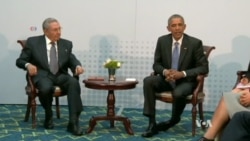After the U.S. military’s failed Bay of Pigs invasion in 1961 and the Cuban missile crisis the following year, President John F. Kennedy chose a different tack on U.S.-Cuban relations by engaging in back channel negotiations with Prime Minister Fidel Castro.
The talks made enough progres that, declassified documents show, a few months after Kennedy was assassinated, Castro sent a secret message to his successor, President Lyndon Johnson, who was up for reelection in 1964.
“If the president feels it necessary during the campaign to make bellicose statements about Cuba or even to take some hostile action,” Castro wrote, “because of domestic political considerations, I shall understand and not take any serious retaliatory action.”
Despite more than half a century of official animosity between the two countries, there have been sub rosa attempts to broker the kind of rapprochement that has just occurred, says Peter Kornbluh, who directs the Cuba Documentation Project at the National Security Archive.
Kornbluh is the coauthor of Back Channel to Cuba: The Hidden History of Negotiations between Washington and Havana, with American University professor William LeoGrande. Discussing the book at the National Archives and Records Administration last month, Kornbluh said that while President Barack Obama is the first U.S. leader to achieve a breakthrough with Cuba, he “is not the first person who tried.”
“Pretty much every president since Kennedy had, if not reached out to Fidel Castro, engaged in talks,” said Kornbluh.
He says one of the most significant efforts, led by Secretary of State Henry Kissinger in the mid-1970s, “might have succeeded had not Fidel Castro decided to send troops into Africa to help the anti-colonial struggle there.”
Obama, who authorized secret talks in 2013, eased travel restrictions for Cuban-Americans, allowing many of them to visit the island and see for themselves whether the decades-long U.S. economic embargo has worked.
Kornbluh says current diplomatic efforts have succeeded partly because of that, and also because of demographic changes in Florida, a key U.S. electoral state with a sizeable Cuban-American population.
“Public opinion there has shifted as the older generation of very anti-Castro Cubans are getting older and dying off and younger Cubans who want to have relations with the island and who see the opening for assisting the evolution of the economy there, simply want to be part of this,” he said.
Developments have unfolded rapidly since government contractor Alan Gross and a CIA spy were exchanged for three Cuban spies in December.
“Barack Obama understands that he has a finite period of time to consolidate this policy change, keep it from being reversed by the enemies of better relations with Cuba after he leaves office,” Kornbluh added.
But obstacles remain, including a decades-long U.S. trade embargo. Just last week, Washington released its annual human rights report citing Cuba for violating basic freedoms in 2014, including the arbitrary arrest of dissidents and restrictions on access to uncensored, independent information.
Latin America analyst Mark Jones of Rice University believes reopened embassies will help both countries grapple with such issues.
"What the establishment of formal diplomatic relations and an embassy will do is allow the countries to begin addressing this host of issues that face both countries," he said.
But it will take an act of the Congress — now dominated by U.S. opposition lawmakers — before the economic embargo can be lifted and ordinary Americans be permitted to travel to the island nation just 90 miles from the southern tip of Florida.





